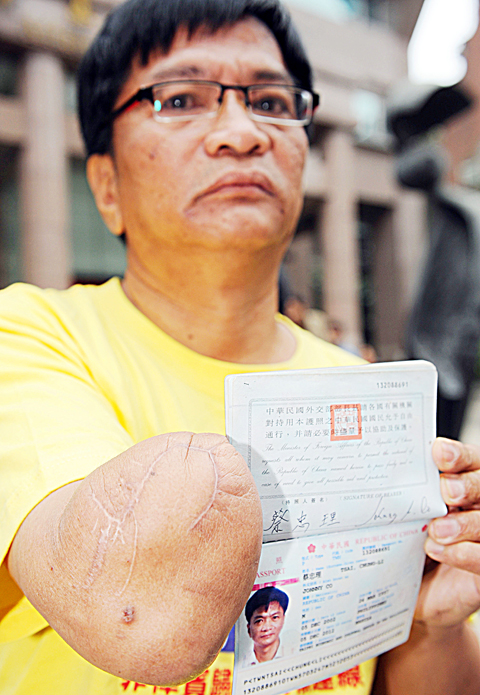Dozens of activists yesterday gathered in front of the Council of Labor Affairs (CLA) building to protest against the government’s failure to protect the rights and benefits of about 2,000 “Republic of China (ROC) nationals without citizenship” living in Taiwan.
Tsai Chung-li (蔡忠理), an ROC national without citizenship, has lived and worked in Taiwan for more than 10 years. He is one of the many people born in the Philippines who hold Taiwanese passports but do not have legal residence status in Taiwan.
Workers such as Tsai, although in possession of ROC passports, are denied legal residence status because the government does not view them as “Taiwanese” and therefore denies them national ID cards. They are mostly born and raised in the Philippines, but hold ROC passports because their parents are ethnic Chinese.

PHOTO: WANG MIN-WEI, TAIPEI TIMES
Tsai’s arm was severed in November last year when it was pulled into a machine at a factory where he worked. However, because his employer did not insure the company’s workers as dictated by labor regulations, Tsai said he could not receive labor insurance compensation and occupational injury compensation that he would have received as a citizen.
Although labor regulations protect such uninsured workers by entitling them to apply for compensation in the event they become disabled from an occupational injury, Tsai’s legal status means he is denied such protection.
“It has been a year since my injury, but I have not received NT$1 in compensation for my arm,” said Tsai, adding that he hoped the labor insurance bureau would take a good look at the problems facing workers like him.
Lorna Kung (龔尤倩), executive director of the Scalabrini International Migration Network in Taiwan and consultant to the Taiwan International Workers Association (TIWA), said there were about 2,000 ROC nationals without citizenship living in Taiwan. Because they are denied legal status to live in Taiwan, they must leave the country for at least one day every six months to renew their visas.
The association urged the government to extend labor rights and benefits to such nationals.
The council said officials would look into the matter and process Tsai’s case as soon as possible. It also said all employers must insure their workers under the national labor insurance plan, regardless of citizenship.

ANOTHER EMERGES: The CWA yesterday said this year’s fourth storm of the typhoon season had formed in the South China Sea, but was not expected to affect Taiwan Tropical Storm Gaemi has intensified slightly as it heads toward Taiwan, where it is expected to affect the country in the coming days, the Central Weather Administration (CWA) said yesterday. As of 8am yesterday, the 120km-radius storm was 800km southeast of Oluanpi (鵝鑾鼻), Taiwan’s southernmost tip, moving at 9kph northwest, the agency said. A sea warning for Gaemi could be issued tonight at the earliest, it said, adding that the storm is projected to be closest to Taiwan on Wednesday or Thursday. Gaemi’s potential effect on Taiwan remains unclear, as that would depend on its direction, radius and intensity, forecasters said. Former Weather Forecast

As COVID-19 cases in Japan have been increasing for 10 consecutive weeks, people should get vaccinated before visiting the nation, the Centers for Disease Control (CDC) said. The centers reported 773 hospitalizations and 124 deaths related to COVID-19 in Taiwan last week. CDC Epidemic Intelligence Center Director Guo Hung-wei (郭宏偉) on Tuesday said the number of weekly COVID-19 cases reported in Japan has been increasing since mid-May and surpassed 55,000 cases from July 8 to July 14. The average number of COVID-19 patients at Japan’s healthcare facilities that week was also 1.39 times that of the week before and KP.3 is the dominant

The Chinese Communist Party’s (CCP) working group for Taiwan-related policies is likely to be upgraded to a committee-level body, a report commissioned by the Mainland Affairs Council (MAC) said. As Chinese President Xi Jinping (習近平) is increasingly likely to upgrade the CCP’s Central Leading Group for Taiwan Affairs, Taiwanese authorities should prepare by researching Xi and the CCP, the report said. At the third plenary session of the 20th Central Committee of the CCP, which ended on Thursday last week, the party set a target of 2029 for the completion of some tasks, meaning that Xi is likely preparing to

US-CHINA TRADE DISPUTE: Despite Beijing’s offer of preferential treatment, the lure of China has dimmed as Taiwanese and international investors move out Japan and the US have become the favored destinations for Taiwanese graduates as China’s attraction has waned over the years, the Ministry of Labor said. According to the ministry’s latest income and employment advisory published this month, 3,215 Taiwanese university graduates from the class of 2020 went to Japan, surpassing for the first time the 2,881 graduates who went to China. A total of 2,300 graduates from the class of 2021 went to the US, compared with the 2,262 who went to China, the document showed. The trend continued for the class of 2023, of whom 1,460 went to Japan, 1,334 went to